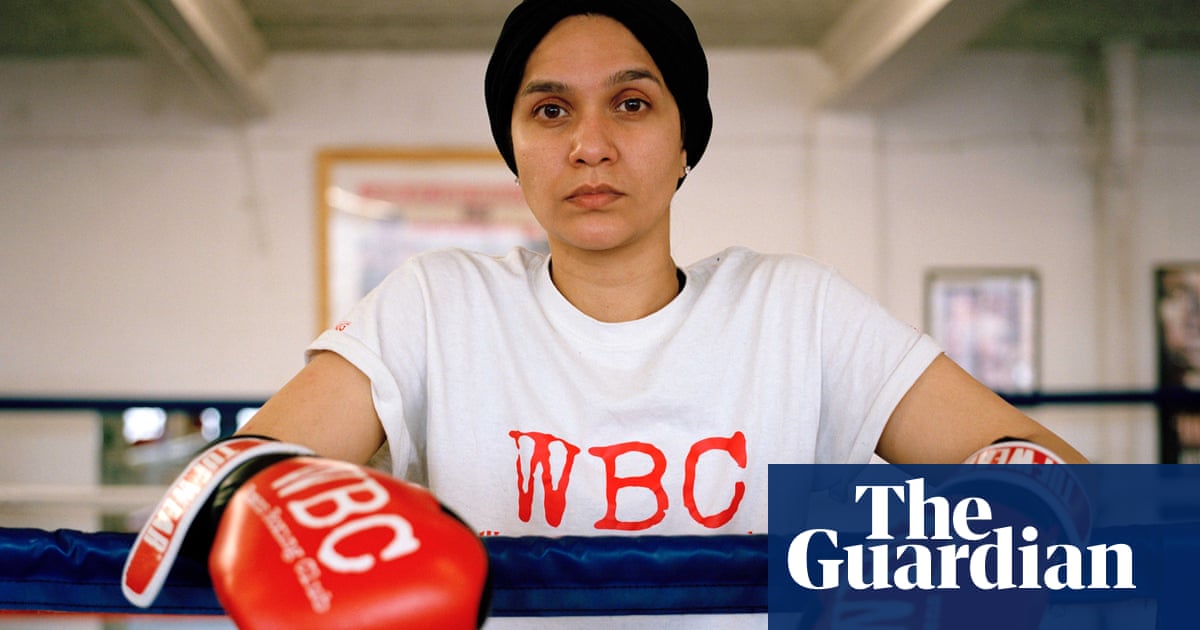
Show caption ‘She has such an aura’ … Mav Akram, co-founder of the Women’s Boxing Club in Digbeth. Photograph: Jaskirt Boora My best shot Mav Akram, the Birmingham boxer and mother – Jaskirt Boora’s best photograph ‘The only sportswomen we see in the mainstream media are elite athletes. But at the grassroots level, there are people of all shapes and sizes’ Interview by Amy Fleming Wed 25 May 2022 16.38 BST Share on Facebook
Share on Twitter
Share via Email
There’s this idea that the best stories are somewhere else, but actually we’ve got great stories on our doorsteps. I was born in Birmingham and I’ve lived here most of my life. I’ve travelled for work, but I’m a Brummie through and through and love celebrating where I’m from. Taking portraits allows me to connect with people, amplify their voices and challenge the narrative.
I first photographed Mav, who runs the Women’s Boxing Club in Digbeth, in 2018 for my project People, Place and Sport. When I returned in 2021, she’d had a baby and we talked about juggling motherhood and our passions for sport and photography. Then there’s her day job. She studied law at university, specialising in human rights, and previously worked as a police officer.
She has such an aura – from sheer strength of character. It comes through in the picture. She was very comfortable in front of the camera. As a south Asian Muslim woman, she is passionate about getting women into boxing, not just for the physical elements, but also mental health. Boxing is a tactical sport: it’s not all about getting hit. It can give you a sense of community.
Most coaches are volunteers: they don’t get paid yet they’re training athletes who might reach elite levels
Yet the only images we see of sportswomen in the mainstream media are of elite athletes. At the grassroots level, there are people of all shapes and sizes. You can be 70 or 80 and still participate, or a south Asian woman or a young Black guy. This grassroots involvement wouldn’t happen without people giving their time for nothing. Most coaches are volunteers: they don’t get paid yet they’re training athletes who might reach elite levels.
I grew up doing sport – you name it, I played it. When I was about 16, and playing football for West Bromwich Albion girls, the anterior cruciate ligament in my knee snapped. I had surgery but it snapped again, putting paid to any sporting ambitions. I went on to do a mixed-media degree, which included photography, and it became a natural way for me to continue exploring my passion for sport.
I always shoot on film. Something magical happens between hitting the shutter and developing the prints – something I’m not part of. Much of the work happens before you start taking pictures, though. I involve the people I photograph, whether by including interviews with them, or making collaborative portraits and asking how they would like to share their story. People respond positively, and start to relax. Often they’re people who aren’t used to being in the spotlight.
When I take pictures, I’m very quiet. I want people to get comfortable. If they are still anxious, I get them to think about what the image is about. For this project, that was: what does this sport mean to you? We’ll be talking about those things in between shots, but in the quiet moments when I’m shooting, having them reflect on it helps.
Some of the exhibitions of my work are in leisure centres and one is outside in a park, because accessibility – and who sees art – is important to me. We’re putting the pictures back into the public spaces where I took the photographs. The feedback I get is often about feeling valued and represented: we don’t tend to see 20 portraits of people in public spaces. When I was growing up, I never saw any photographs of south Asian or Punjabi girls playing sport. I’m trying to redress that balance.
Jaskirt Boora
Jaskirt Boora. Photograph: Tiberiu Popescu
Born: Birmingham, 1985.
Trained: BA (Hons) Communication, Culture and Media, Coventry University.
Influences: Rineke Dijkstra, Diane Arbus, Chila Kumari Burman, Rinko Kawauchi, Jenny Lewis
High point: “Finding a new purpose in my photography in 2020 when I started working with women’s refuge Birmingham Crisis Centre and then made the Birmingham Lockdown Stories project. This led to me winning the BJP Portrait of Britain award – and Birmingham Museum and Art gallery acquiring 12 of my portraits.”
Low point: “Not understanding how to navigate the art world in my 20s.”
Top tip: “Make work that adds positivity to your community and yourself.”
• People, Place and Sport is part of the Birmingham 2022 festival that continues until 31 August.







